FOI Exposes EHRC Bias: Private Meetings, Legal Echoes, and Policy Capture
- Maddie, Trans Advocacy and Complaints Collective
- Jul 1, 2025
- 10 min read

Let’s be honest. The Equality and Human Rights Commission is not acting like a neutral regulator. It is not standing above the fray. It is not impartial. And now we have over a hundred pages of internal emails to prove it.
The EHRC has been captured.
Through a Freedom of Information request, we obtained a trove of correspondence between EHRC senior leadership and the gender-critical lobbying group Sex Matters, with repeated appearances by Transgender Trend and its director, Stephanie Davies-Arai. These aren’t brief emails from junior staff. They include private meetings arranged with the EHRC Chair and CEO, backchannel lobbying, and full acceptance of policy proposals well beyond what would be expected in a public consultation.
This is not regulatory neutrality. This is institutional bias by design.
Who Gets Access? Who Gets Privilege?
In email after email, Sex Matters is handed priority. They’re invited to meetings at EHRC headquarters. Their letters are replied to personally by Baroness Kishwer Falkner. Their suggestions are welcomed, circulated, and in some cases, reflected word-for-word in updated EHRC guidance.
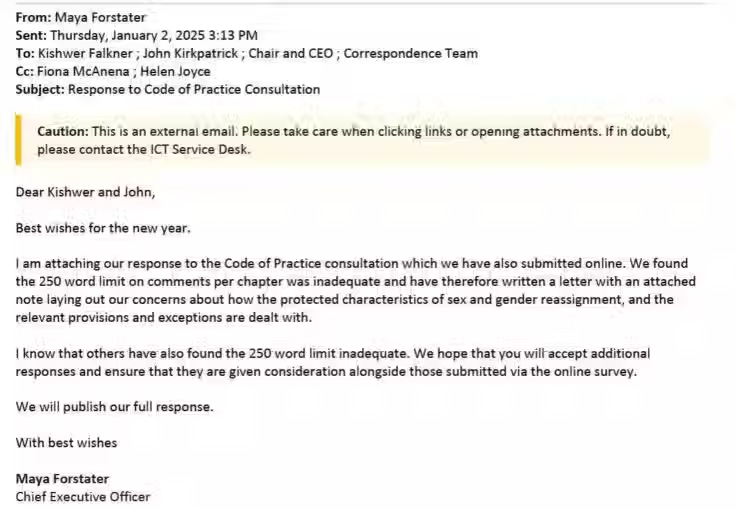
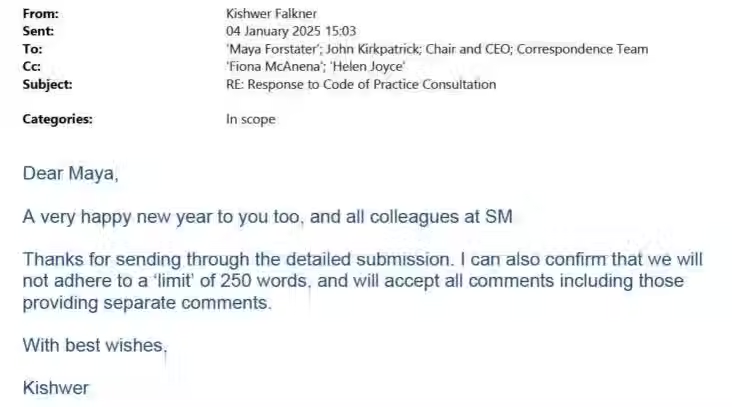
They even emailed additional submissions to the consultations because the online response form had a character limit. The EHRC accepted them. No evidence was required. No red flags raised. This was a workaround that no other group was visibly offered. It granted them extended space to shape national equality policy.
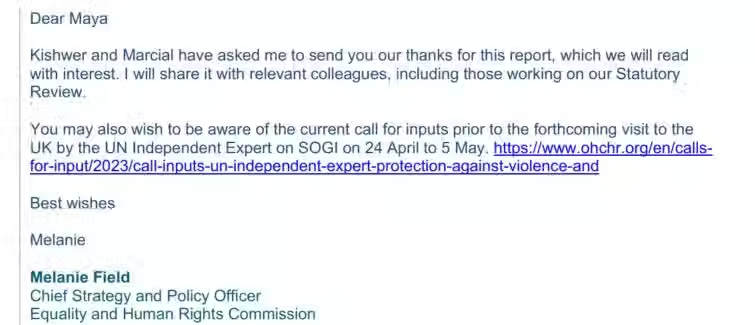

When Sex Matters wanted a private meeting about sports policy, EHRC staff initially directed them to the public consultation, and then met with them anyway. Their commentary was not only acknowledged but actively incorporated into the EHRC draft guidance and policy frameworks.
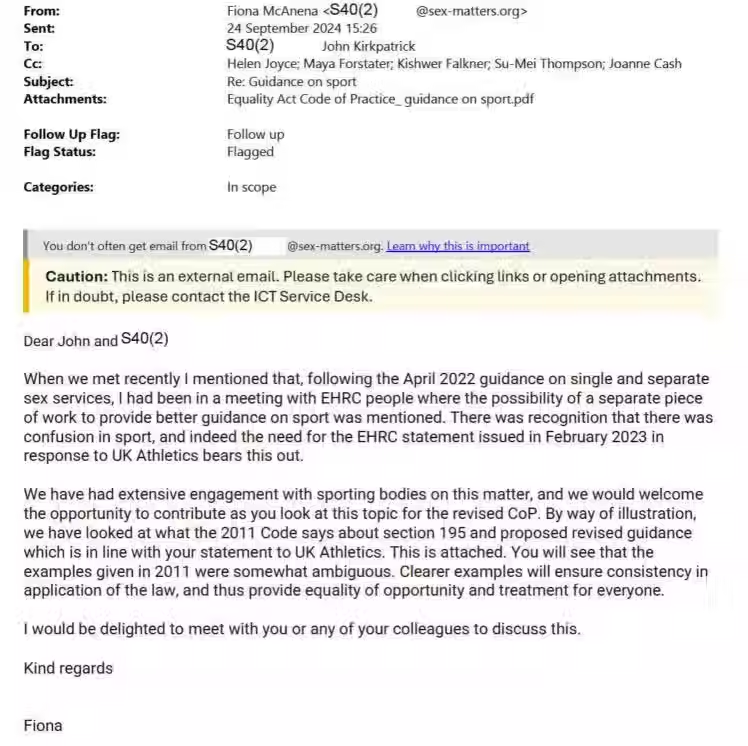
Transgender Trend — another group whose mission includes the rollback of transgender inclusion in schools and public life — appeared in joint submissions and was regularly cc’d in correspondence. The EHRC responded to letters addressed jointly to Maya Forstater, Helen Joyce, and Stephanie Davies-Arai, treating their combined views as a unified stakeholder position.
The Shape of Influence
What emerges across this correspondence is a deeply unbalanced relationship. Sex Matters regularly provides detailed policy briefings, legal interpretations, and recommended language. Transgender Trend co-signs many of these letters. And the EHRC? It listens. It thanks them. It shares their documents internally. It brings their arguments into internal guidance.
The EHRC’s single-sex service guidance, its position on sport, and its school policy revisions are all steeped in the framing pushed by these gender-critical groups — a framing that prioritises biology, questions the validity of Gender Recognition Certificates, and treats trans inclusion as a legal threat to women’s rights.
One example: EHRC internal guidance on sports explicitly adopted Sex Matters’ position that trans women could be excluded regardless of whether they hold a Gender Recognition Certificate, if organisers could justify it. That interpretation mirrors gender-critical talking points — but departs from the previous consensus that GRC-holders are to be treated as their acquired gender “for all purposes” under the Gender Recognition Act 2004.
Another example: Sex Matters frequently misrepresented the law, claiming that the Equality Act’s protections did not require recognising a GRC-holder’s legal sex. That’s simply false. Yet EHRC did not challenge this framing. In fact, the Commission’s correspondence uses the same language of “legal uncertainty,” echoing the talking points rather than correcting them.
Sex Matters also lobbied the EHRC to define “sex” in law as strictly biological. EHRC’s Chair, Baroness Falkner, and its CEO responded favourably, promising to reflect on the legal complexity, without ever asserting that the current law recognises legal gender change. The Commission even thanked Sex Matters for submitting a public opinion survey that equated trans inclusion with loss of safety, legitimacy, and fairness. These survey results, deeply biased and methodologically unsound, were shared internally within the EHRC with no indication of concern.
Meanwhile, the EHRC’s outdated schools guidance — still in circulation at the time — used shockingly blunt phrases like “schools should not pretend a girl is a boy.” In the FOI, the Commission acknowledged that this guidance was flawed and promised to revise it, but did so only after sustained criticism. Sex Matters continued to lobby for more restrictive policies.
Across legal domains — from the Gender Recognition Act to the Human Rights Act, from education law to data protection — Sex Matters pushed one-sided and often inaccurate readings of the law. They claimed the HRA required biological sex to be recognised over legal gender, despite no such obligation existing in UK or European case law. They argued that a GRC should be “disregarded” for Equality Act purposes — even though s.9(1) of the Gender Recognition Act explicitly states it changes a person’s legal gender “for all purposes.”
The EHRC did not endorse these views outright, but nor did it push back. It let them stand. And in several cases, it quietly adopted the framing without attribution.
In employment law, EHRC guidance clarified that a GRC-holder could be excluded from a women-only post under Schedule 9 — if objectively justified — reflecting Sex Matters’ demand for exclusions. On data protection, their school guidance advised that sex is not sensitive data and schools must record it as birth sex, again reinforcing Sex Matters’ position, despite growing concern over the implications for children’s privacy.
Even where the EHRC’s legal statements were technically accurate, their failure to challenge misleading claims, their adoption of anti-trans framings, and their selective emphasis on certain interpretations all point to a regulatory body in ideological alignment with its lobbyists.
Coordinating with Interveners in Court
The FOI documents also reveal that in August 2024, during the high-profile Higgs v Farmor’s School case — a case concerning alleged discrimination tied to gender identity and religious belief — the EHRC contacted interveners, including Sex Matters, requesting access to their legal submissions in advance.

On the surface, this might appear routine. But in the context of EHRC’s ongoing alignment with gender-critical groups, it fits a troubling pattern. Soliciting legal arguments from a political advocacy group — one that repeatedly misrepresents the law and uses dehumanising language like “trans-identifying male” — blurs the line between regulator and partisan ally.
There is no evidence in the FOI that similar requests were made to trans equality organisations, legal experts with different interpretations, or LGBTQ+ advocacy groups. Once again, the EHRC appears to be prioritising one ideological perspective, treating it not just as input but as a partner in legal and policy development.
Inaccurate Law, Unchallenged Claims
Sex Matters has repeatedly misrepresented the law, suggesting, for instance, that a GRC does not change someone’s legal sex under the Equality Act, or that the Human Rights Act requires organisations to treat everyone by their birth sex. These are not just contested interpretations — they are incorrect. The Gender Recognition Act 2004 explicitly states that someone with a GRC must be treated as their acquired gender “for all purposes.” UK courts had upheld this interpretation for years.
Sex Matters claimed that recognising legal gender change was somehow unlawful under the Human Rights Act — a misreading that conflates political ideology with settled law. They dismissed the Gender Recognition Act as a legal “epicycle” and demanded that the EHRC back their reading. The EHRC never corrected this.
In fact, in its own updated guidance, the EHRC adopted many of these frames. Their single-sex services code and sports guidance reinforce the idea that biological sex trumps legal recognition. They interpret the Equality Act to allow blanket exclusions if “objectively justified” — but never clearly define who determines that justification, nor how trans people’s rights factor into it.
Extent of Access and Influence
Internal mail also records that the EHRC Chair and CEO met with Sex Matters in September 2024, which was a follow-up to the January 2024 meeting. EHRC staff even thanked Sex Matters for policy reports and circulated them internally – a correspondence from an EHRC official thanked Sex Matters for its “report” and said it would be shared with colleagues working on the statutory review. In short, beyond public consultations, the EHRC gave Sex Matters (and Transgender Trend, via joint letters) privileged access through letters, emails and meetings with senior EHRC officials, indicating a high volume of contact and influence.
The EHRC also notified Maya Forstater in advance of releasing materials in response to a previous FOI request about her group’s meeting with the Commission. Rather than treating the meeting minutes as ordinary public records, the EHRC gave Forstater a deadline to raise objections and “explain clearly the harm” of disclosure — language typically used to justify withholding information under FOIA exemptions. While technically legal, this kind of pre-clearance is deeply inappropriate in context.
Sex Matters is not a neutral third party — it is a politically active lobbying group with a direct interest in influencing EHRC policy. Granting them the opportunity to shape or delay the release of potentially unflattering documents reinforces the pattern of deference and preferential treatment that runs throughout this FOI.
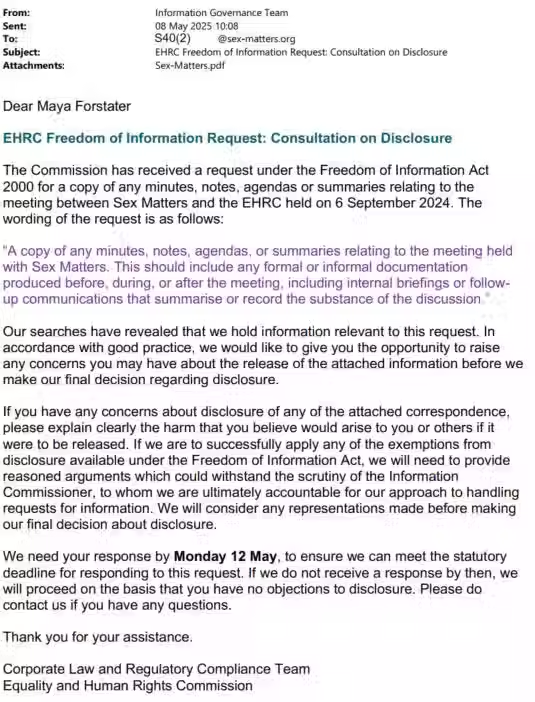
Politically Sensitive Secrecy
The FOI correspondence reveals that in June 2024, ahead of the general election, the EHRC sought to keep its planned meeting with Sex Matters private — not for reasons of confidentiality or national security, but explicitly to avoid political scrutiny during a “sensitive pre-election period.”
In an email to Maya Forstater, a senior EHRC official wrote:
“Our subjects of discussion are potentially politically sensitive, particularly in light of very recent media activity, so I wanted to check with you ahead of our meeting whether you would be content for this to be a fully private meeting, with no material or information published or shared?”
And the kicker:
“If you have a policy of transparency… could I please request that we delay this meeting until after the election?”
This is not neutral governance. This is the national human rights body proactively proposing to delay or conceal its engagement with a political pressure group, not to ensure fairness, but to avoid headlines. This appears to have been rescheduled to the September meeting, which we previously revealed.
The Commission’s attempt to manage optics, rather than act transparently and impartially, further erodes its credibility. That it would ask Sex Matters — not an impartial stakeholder but an ideologically-driven lobby group — to help choreograph the timing and privacy of a meeting speaks volumes. It raises the question: if EHRC policy discussions must be hidden from public view during an election, whose interests are they serving?
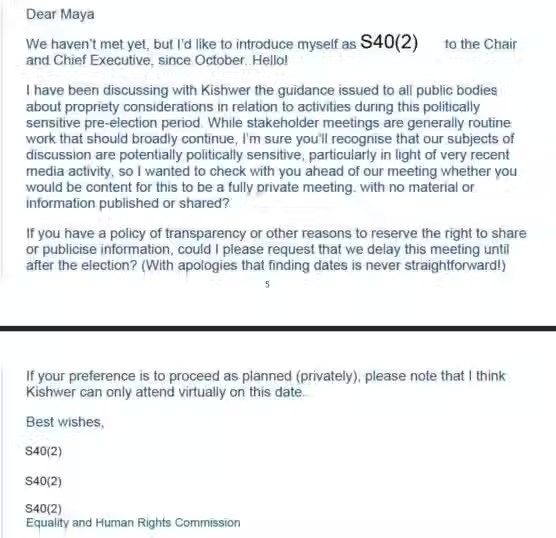
Policy or Language Alignment
EHRC’s published guidance closely reflects gender-critical framing. In its updated Equality Act Code of Practice (Services), the EHRC explicitly endorses separate women’s and men’s sports and allows excluding a “transsexual person” if necessary for fair competition. This mirrors Sex Matters’ and Transgender Trend’s demands for binary sex categories in sport. Similarly, EHRC defended its single-sex services guidance in court by clarifying that trans people “can be excluded from accessing such services if their exclusion can be objectively justified.” – language and substance advocated by gender-critical lobbyists.
The EHRC also declined requests for bespoke sports guidance, stating that its Code of Practice already covers the law on sex, gender, and sport, effectively cementing the existing (sex-protective) interpretation in regulation. The then CEO of the EHRC, Marcial Boo’s correspondence repeatedly emphasizes sex over gender: he insisted that EHRC “do not use the Equality Act to promote childhood transition”, deferring medical decisions to clinicians. This line echoes the stance of gender-critical groups.
Taken together, the EHRC’s code sections and public replies on sports, schools and single-sex services consistently adopt the framing urged by Sex Matters/Transgender Trend (e.g. priority of biological sex, cautious approach to transition), rather than a more inclusive trans-affirming language.
(Lack of) Impartiality Relative to EHRC’s Mandate
The EHRC is legally bound to uphold equality for all protected groups without favour or prejudice. Yet the FOI materials paint a different picture — one in which the Commission leans heavily into gender-critical framing, while trans rights are sidelined. Publicly, its leaders insist that “independence and impartiality is non-negotiable.” But privately, in both tone and substance, their communications tell another story. Policy revisions on sport, schools, and single-sex services consistently reflect gender-critical priorities: biological essentialism, exclusion justified as safeguarding, and a deep suspicion of trans inclusion. Even the EHRC’s response to the Department for Education’s school guidance consultation reassured critics that it had inserted a reference to Section 175 of the Education Act — a nod directly cribbed from Sex Matters and Transgender Trend’s language.
What’s missing is just as telling. Nowhere in these documents do we see the EHRC engaging with alternative legal framings or proactively defending the rights of those with the protected characteristic of gender reassignment. There is no sign of attempts to balance the law, only to narrow it. Instead of applying the Equality Act fairly across competing rights, the EHRC appears to have aligned itself with one ideological perspective, undermining its duty to serve as an impartial regulator.
The FOI documents expose a pattern: Sex Matters and Transgender Trend were given privileged access to EHRC leadership — meetings behind closed doors, swift replies from the Chair and CEO, even special exceptions for consultation submissions. Their talking points show up again and again in official EHRC guidance, stripped of attribution but intact in structure. The language of “biological sex,” “safeguarding,” and “clarity” appears as institutional policy.
Worse still, throughout this correspondence, Sex Matters repeatedly used the term “trans-identifying male” to refer to trans women — a term widely understood to be derogatory and dehumanising, deliberately used to strip trans women of their legal and social status. This wasn’t a one-off. It was systematic and embedded in their messaging. The EHRC never once challenged it. Not in their replies. Not in their guidance. Not in any clarification. The refusal to even acknowledge the harm in such language speaks volumes, especially from a statutory body that claims to protect all nine protected characteristics.
This isn’t neutral oversight. It’s regulatory capture. And it signals a deep, systemic partiality that undermines the very purpose of an equality watchdog.
What They Won’t Tell You
The release of this FOI was itself delayed. Despite being submitted weeks in advance, the EHRC chose to release the materials after 6 pm on 30 June 2025, over six hours after the deadline for responses to its high-profile consultation on the Codes of Practice (although it can still be submitted in Welsh).
Whether deliberate or convenient, the timing ensured that the public could not meaningfully analyse or cite the contents of this FOI before the consultation closed. What could have informed public submissions instead arrived just in time to be buried. It’s hard not to see this as a tactic — a quiet data dump to avoid scrutiny, not a commitment to transparency.
The EHRC didn’t release everything either. In their FOI response, they confirmed they are withholding material under:
Section 31 (law enforcement): claiming disclosure would harm their regulatory function, even though the request relates to lobbying, not investigations.
Section 32 (court records): citing documents connected to legal proceedings, without specifying which.
Section 40 (personal data): redacting not just junior staff details, but also communications involving named public figures, although these are often email addresses or signatures.

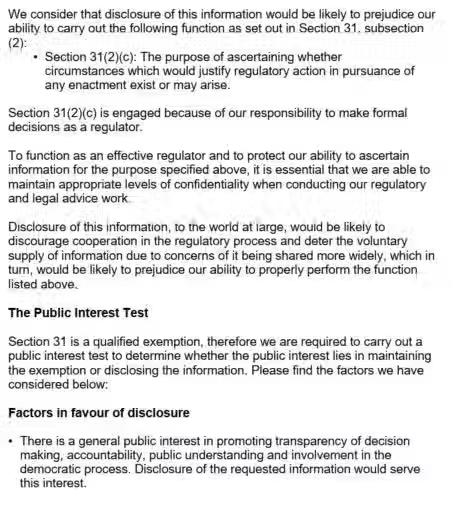

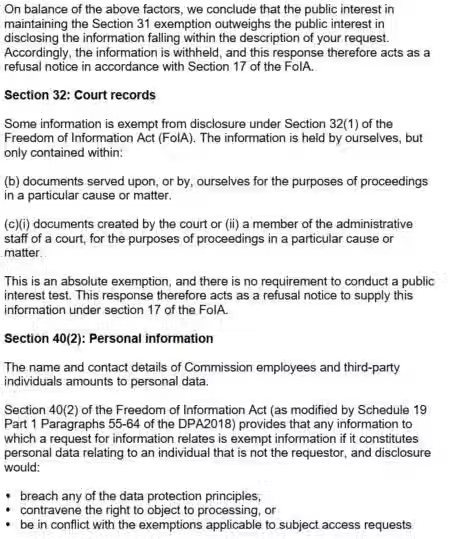
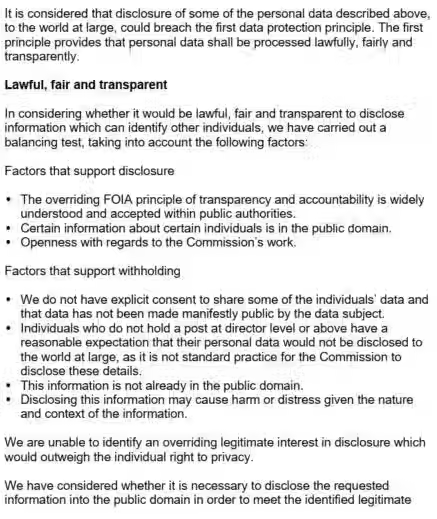
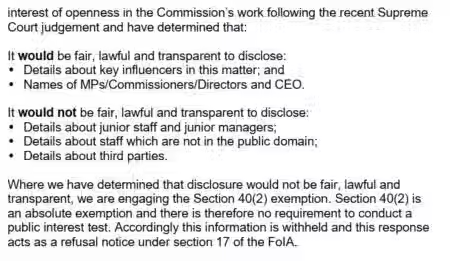
These are public bodies discussing public law. They are not entitled to secrecy around how policy is shaped, especially not when it involves the rights of marginalised communities. The FOI exemptions used here are disproportionate, vague, and serve to obscure influence.
We’ve submitted a formal request for internal review. The public deserves to know the full extent of how these relationships shaped national equality law. Because what’s already visible is disturbing enough.
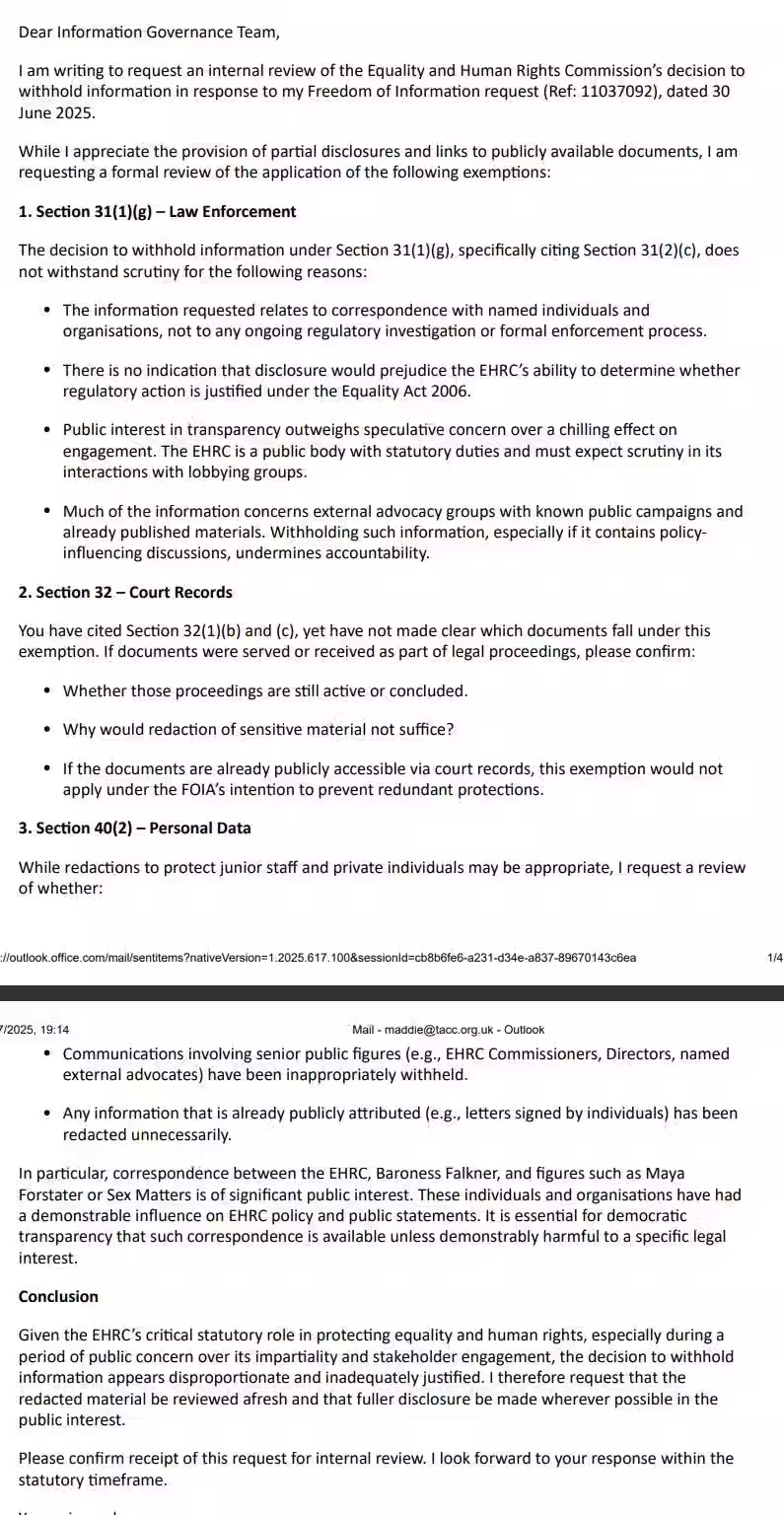
The Bigger Picture
This isn’t just about emails. This is about a public body entrusted with safeguarding the rights of all of us, especially the most marginalised. And it’s about that body allowing itself to be steered by one political faction, behind closed doors, while hiding behind procedural language and vague promises of balance.
Trans people are not a theoretical risk. We are not a consultation box to be ticked. We are citizens. And we deserve regulators who act independently, lawfully, and without bias.
This FOI release is a window into how institutional power is shaped — and who it listens to. We’ve looked through that window. What we saw is deeply disturbing.
The EHRC must answer for it.
All photos are via he Trans Advocacy and Complaints Collective.
To view these messages in full, follow the link below.
(c) 2025, Trans Advocacy and Complaints Collective
.png)



Comments